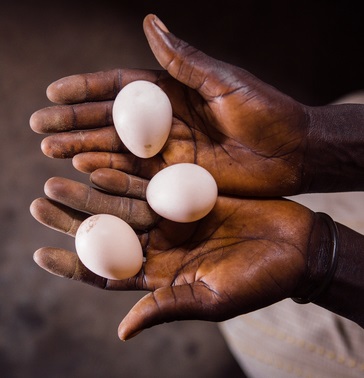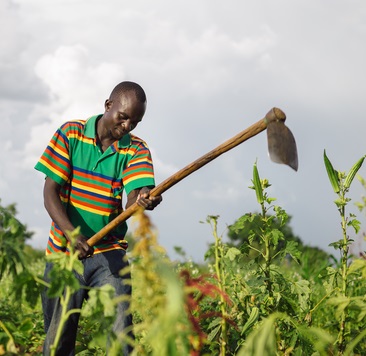South Sudanese refugees in Uganda: “When children stop playing, it is time to get worried”
The greatest fear of Muja Rose, a refugee from South Sudan, is that her daughter will starve to death. Uganda is at a breaking point in the throes of the biggest refugee crisis in Africa since the Rwanda genocide.
The children were playing when war found the family of 34-year-old Muja Rose in South Sudan.
Government soldiers arrived without warning in their hometown of Kajo Keji. They were immediately caught by surprise by a group of rebels. People were killed and their possessions were looted.
Rose’s husband was away, and in the crossfire, Rose made the toughest decision of her life.
”The only alternative was to run as fast as my feet would carry. I decided to take the children to Uganda,” says Rose.
Rose managed to take her own four children as well as two children who had lost their mother with her. She carried the youngest one on her back through the bush and stayed up all night to protect the children from wild animals. They had no food or water.
”The children were crying out of hunger and exhaustion. When we found a dry streambed, I tried to dig for water in the ground to have drinking water for the children.”
Food is a constant preoccupation
A year later, all the children are seated around a clay oven in the Bidibidi refugee settlement. The area, the size of Turku, has 290,000 inhabitants, which would make it the second biggest city in Finland after Helsinki.
The clay oven is located in the only shaded spot in the yard, and attracts others to seek shelter from the relentless sun. The aroma from the sizzling pot is familiar from any kitchen in the world: fried onions.
Rose chops a few eggplants from her vegetable garden and adds them to the pot, with 10-year-old Ayite stirring the stew.
”Once a week we cook eggplants, once okra, once vegetables. The remaining days we eat beans,” says Rose.
”The food has no variety and the children are sick all the time. They’re not getting all the vitamins they need.”
Food is constantly on Rose’s mind. Even though the demanding journey to Uganda has reduced the risk of becoming victim to bullets or rape, life is a taxing struggle to meet basic needs. She is not alone in this situation.
Over a million people from South Sudan have crossed the border to Uganda, almost all of them after July 2016.

Some refugees are lucky to have chicken that produce eggs. Most, like Muja Roses family, have left behind all their possessions when fighting broke out. Photo: Tatu Blomqvist
Taking care of the crisis costs about 560 million euros per year, but the international community has only met a third of the need. According to the UN, Uganda is at a breaking point. The refugees most feel this in the food rations that have been halved twice, says Bik Lum, regional head of UN refugee agency UNHCR.
The food aid delivered monthly includes beans, vegetable oil, salt, and maize meal. At the end of last year, the maize meal rations were cut from 12 kilos to 6 kilos per person.
”Some have risked their lives and gone to South Sudan to look for food in their abandoned homes,” says Lum.
One meal a day
Uganda, a country smaller and poorer than Finland, has despite its limited resources admitted all refugees into the country.
The Ugandan refugee policy is praised as forward thinking in the western world, since among other things, it guarantees everyone a piece of land to live on and cultivate. This does not mean that life in refugee settlements feels meaningful.
More land has continuously been cleared from previously unliveable bush, and growing things to eat is hard.
Rose’s yard is rocky, but as a woman with green fingers, she has managed to grow something. So has Wani Garanep, living in the neighbouring village, who participated in Finn Church Aid’s (FCA) cultivation training.
FCA has provided participants with seeds and tools. Sesame, okra, and tomatoes are growing next to Garanep’s clay hut. Since the ground is rocky, Garanep and his wife Kaku have learned to fill sacks with dirt. Onions and eggplants are growing in these sacks.

Wani Garanep’s family has managed to diversify their diets with vegetables after participating in FCA’s livelihoods training. Photo: Tatu Blomqvist
However, because of slashed food rations, the family has been forced to cut their daily meals from two to one. This goes for most of Bidibidi’s inhabitants.
”I would like to guarantee a good education for my children, but they can’t concentrate in school when they’re hungry, and they often come home before the school day is over,” says Garanep.
Garanep is a builder by trade. In South Sudan, he cut down trees and sold them as building material. The family could afford to eat meat.
Rose worked as a teacher, and the family had no shortage of food.
The hometown she left behind, Kajo Keji, was located in Equatoria, the breadbasket of South Sudan, known for its fertile soil. Before the war, the region was able to feed millions of people. Rose’s family had goats and chickens.
”When the children were hungry, they would pick fruit or cassava from our garden,” she says.
However, Kajo Keji is empty. Three quarters of the population of Equatoria have left their homes and Northwest Uganda is like one big refugee settlement that it takes hours to drive through.
Here, Garanep and Rose find it hard to find work with which to improve their families’ situation.
”Sometimes when the children are really hungry, they ask me ’mom, can’t we go back home to South Sudan so that we could eat.’ It’s hard to explain to them that there is still a war going on there,” continues Rose.
Life as a single parent is tough
After the meal, things get more active in the yard. With 13-year-old Gire and 9-year-old Diko in the lead, the children dig out a skipping rope. With great enthusiasm, Ayite counts her skips in English. This makes her mother happy.
They are more eager than usual because there are visitors, she explains. When the children are quiet and too tired to play, it is time to worry, she says.
Gire and Diko are not Rose’s own children, but after their flight together, they sleep together with Rose’s children.
”Sometimes they ask me where their mother is. Once the war is over, we will return to look for her.”
Life as a single parent is especially hard in the refugee settlement. Over 60 percent of the refugees in Uganda are under 18 years old, and most of the adults are women. When women and children fled, men took part in the fights – some forced, others voluntarily – or died in the conflicts.
In Rose’s yard, it is evident that she has to keep an eye on more than a dozen children, with barely no other parents in sight. Rose often worries about how long she will manage if the situation is prolonged.
”I miss my husband. I don’t know whether he’s alive or dead. I haven’t heard from him since we had to run away,” she says.
During the interview, Rose mends the trousers of her youngest child, 3-year-old Wani. They have to be taken in at the waist once again. Rose is most worried about 10-year-old Ayite, who has gone down from 25 kilos a year ago to just 19 kilos.
Being underweight makes Ayite vulnerable to disease and malnutrition.
”If she loses more weight, I might even lose her,” says Rose.
Text: Erik Nyström, photos: Tatu Blomqvist
This year, 60 percent of the funds collected in the Common Responsibility Campaign are directed to the Finn Church Aid disaster fund. Read more about FCA in Uganda here.